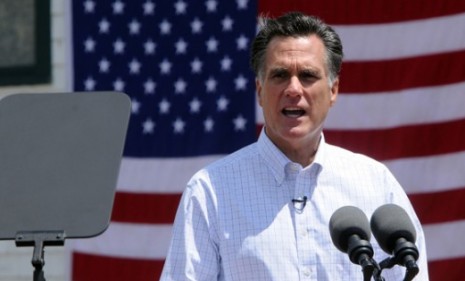Mitt Romney's 'balancing act' campaign announcement
The presumed frontrunner for the GOP's presidential nomination officially enters the race. Can he win over the base without swinging too far right?

A free daily email with the biggest news stories of the day – and the best features from TheWeek.com
You are now subscribed
Your newsletter sign-up was successful
The video: Well, it's official. On Thursday, Mitt Romney announced in New Hampshire that he's running for president... again. (Watch clip below.) The ex-Massachusetts governor, who finished behind John McCain and Mike Huckabee in 2008, is the presumed frontrunner for the 2012 GOP nomination, thanks to his fundraising prowess, name recognition, and campaign experience — not to mention a rather lackluster GOP field. In breaking the news, Romney charged that the president "has failed America" by not rescuing the economy (prompting the Obama administration to immediately reply that it was saddled with a historically terrible economy). The Tea Party has already launched a "Stop Romney" campaign. And Sarah Palin briefly upstaged Romney's announcement with criticism of his Massachusetts health care plan — which bears striking resemblances to President Obama's.
The reaction: Romney's speech boiled down to this: "Things are bad, things are bad because of Obama, elect me and I'll use my business background to fix things," says Philip Klein in the Washington Examiner. But hey, "in a weak GOP field, this could be enough to win." It's not like he has other options, says Joshua Green in The Atlantic. "Romney isn't a passion-and-charisma candidate, so his best bet is to focus on the economy." The former Massachusetts governor also tried to "feed red meat" to conservatives by labeling Obama as "European," says Greg Sargent in The Washington Post. But he should be careful with this "balancing act." If he swings too far right, he'll fail in "preserving his aura and stature as a non-crazy alternative to the likes of Sarah Palin and Michele Bachmann." Watch a clip from Romney's speech:
A free daily email with the biggest news stories of the day – and the best features from TheWeek.com
The Week
Escape your echo chamber. Get the facts behind the news, plus analysis from multiple perspectives.

Sign up for The Week's Free Newsletters
From our morning news briefing to a weekly Good News Newsletter, get the best of The Week delivered directly to your inbox.
From our morning news briefing to a weekly Good News Newsletter, get the best of The Week delivered directly to your inbox.
-
 Democrats push for ICE accountability
Democrats push for ICE accountabilityFeature U.S. citizens shot and violently detained by immigration agents testify at Capitol Hill hearing
-
 The price of sporting glory
The price of sporting gloryFeature The Milan-Cortina Winter Olympics kicked off this week. Will Italy regret playing host?
-
 Fulton County: A dress rehearsal for election theft?
Fulton County: A dress rehearsal for election theft?Feature Director of National Intelligence Tulsi Gabbard is Trump's de facto ‘voter fraud’ czar
-
 The billionaires’ wealth tax: a catastrophe for California?
The billionaires’ wealth tax: a catastrophe for California?Talking Point Peter Thiel and Larry Page preparing to change state residency
-
 Bari Weiss’ ‘60 Minutes’ scandal is about more than one report
Bari Weiss’ ‘60 Minutes’ scandal is about more than one reportIN THE SPOTLIGHT By blocking an approved segment on a controversial prison holding US deportees in El Salvador, the editor-in-chief of CBS News has become the main story
-
 Has Zohran Mamdani shown the Democrats how to win again?
Has Zohran Mamdani shown the Democrats how to win again?Today’s Big Question New York City mayoral election touted as victory for left-wing populists but moderate centrist wins elsewhere present more complex path for Democratic Party
-
 Millions turn out for anti-Trump ‘No Kings’ rallies
Millions turn out for anti-Trump ‘No Kings’ ralliesSpeed Read An estimated 7 million people participated, 2 million more than at the first ‘No Kings’ protest in June
-
 Ghislaine Maxwell: angling for a Trump pardon
Ghislaine Maxwell: angling for a Trump pardonTalking Point Convicted sex trafficker's testimony could shed new light on president's links to Jeffrey Epstein
-
 The last words and final moments of 40 presidents
The last words and final moments of 40 presidentsThe Explainer Some are eloquent quotes worthy of the holders of the highest office in the nation, and others... aren't
-
 The JFK files: the truth at last?
The JFK files: the truth at last?In The Spotlight More than 64,000 previously classified documents relating the 1963 assassination of John F. Kennedy have been released by the Trump administration
-
 'Seriously, not literally': how should the world take Donald Trump?
'Seriously, not literally': how should the world take Donald Trump?Today's big question White House rhetoric and reality look likely to become increasingly blurred